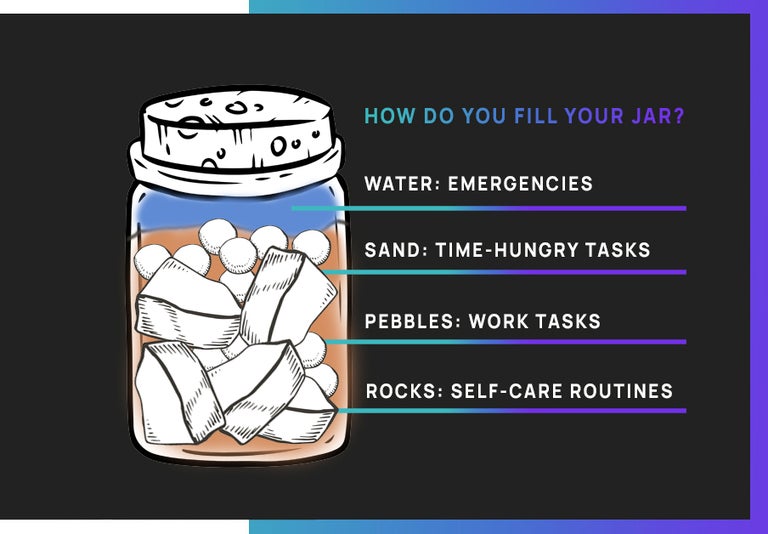Contents
- A Look Inside the Mason Jar: Prioritizing Your Main Resource
- Big Rock Routines: Building Them Around the Five Pillars
- 1) Mental Self-Care
- 2) Emotional Self-Care
- 3) Physical Self-Care
- 4) Environmental Self-Care
- 5) Social Self-Care
Do you practice self-care at work? When you work remotely, self-care tends to drop to the bottom of a long list of to-dos. But your ability to prioritize self-care first will be the defining trait in your career as a remote leader.
- 16% of companies are fully remote now
- Remote workers earn $19,000 more than in-office workers
- 69% of remote workers experience burnout from digital communication tools
With more companies hiring remotely, and more opportunities in remote work than ever – it’s wise not to ignore the dangers of ‘always-on’ remote culture and risk burning out.
Self-care might seem like a term created by the beauty industry to sell products – but it really just means:
Do what’s good for you, even when it’s hard.
So, let’s talk about the most difficult kind of all - professional self-care – as someone working remotely in the world today.
A Look Inside the Mason Jar: Prioritizing Your Main Resource
Imagine your day is like a mason jar. How you fill it matters.
- Big rocks: Your professional self-care routines like constant learning and schedule alignment.
- Pebbles: Work-related tasks like management, delegation and the report that’s due.
- Sand: Time-hungry communication tasks like meetings and email rabbit holes.
- Water: Unexpected work emergencies like a deadline due 20 minutes from now.

Fill your day with sand and pebbles first, and there won’t be any room for big rocks in your jar. But start with big rocks, followed by pebbles and the rest – and everything will fit. Even time-hungry communication and unexpected events.
As a remote leader, prioritizing yourself is key if you’re going to make everything fit in your day.
Big Rock Routines: Building Them Around the Five Pillars
“We are what we repeatedly do.” - Aristotle
In self-care, a routine is a repetitive behavior that helps you stay aligned with your goals. They go beyond habit and become automatic, which saves your mind and body energy.
Consistent professional self-care routines are a powerful ally in the battle against burnout.
There are positive and negative routines, and they’re not always obvious.
If you wake up in the morning, and the first thing you do is scroll on your phone for 20 minutes, that’s a negative routine that you’ve built into your life.
According to Harvard Business Review, 92% of highly productive people have morning routines – so examining yours and intentionally making it self-care orientated is critical to your professional success.
As you learn about these five pillars of self-care, consider the routines that you could build around them to make your professional life not just easier – but better.
1) Mental Self-Care
What does mental self-care at work look like when you work remotely?
- Taking an hour to make progress on an e-course
- Reading the latest industry trends and news to stay up-to-date

Whether you’re working from a home office, or you’re in travel-mode – prioritizing your mental wellbeing sets you up for cognitive success. Aim to achieve the maximum amount of clarity and mindfulness in your day, by setting smart self-care routines.
- Monotasking breaks: Taking regular breaks can improve your productivity by 52%, according to this Buffer study. The goal is to deactivate, then reactivate your focus or attention. And – contrary to popular opinion – you don’t have to do something radically different or completely unrelated to get this benefit.
Multitasking slows most people down, but so does monotasking if you fail to take these intentional breaks.
Harvard Business Review says that effective monotasking lowers the burden on working memory, reduces vulnerability to distraction, and it helps you complete tasks faster.
But it relies on your ability to work in intervals – take intentional breaks – then continue. The key is to establish a mental rhythm that works for you.
Some Short Breaks for Mental Rhythm
- Work on your project, then spend 10 minutes catching up on industry news
- Block out an hour of your day when you are least productive, to learn
- When you’re really unproductive then take 20 minutes to have a power nap
One of the benefits of napping when you work remotely, is you often have access to a bed. And extensive studies have proven that napping, especially after lunch, improves cognitive performance.
Embrace what the Japanese call ‘inemuri’ – and wake up your brain when you need it. When your schedule is flexible this could strike at any time, take care of it when it does.
2) Emotional Self-Care
What does emotional self-care at work look like for remote workers?
- Being self-aware and knowing how to advocate for what you need
- Communicating at the right time to protect your emotional state

This second pillar considers your emotions and how remote work impacts them on a daily basis.
Being plugged into the online world 24/7 means absorbing a lot of bad news, misinformation and hype advertising. It can lead to emotional fatigue if you don’t guard against it.
The same is true for virtual meetings, text exchanges and other forms of async communication. It’s easy to come across as blunt, critical or worse in digital environments if you’re not careful.
In this pillar, your routines will help you regulate what remote work makes you feel.
- Limit exposure: Use technology to combat technology. Install ad blockers and take an active role in filtering or hiding disturbing content across all of your online channels. The average American sees up to 10,000 ads a day. And they are impacting your emotional wellbeing. If something upsets you, turn it off. Limit it. Hide it. Remove it.
- Advocate for yourself: Expand on your ability to ask for what you need. You’re not in an office so no-one will see that you’re sick, or tired, or that something big and life-changing is impacting your work right now. You need to be your own advocate.
This needs to be communicated to the right people, at the right time. Otherwise, your energy and general emotional state will become worse than it has to be.
That’s when emotions boil over and result in outbursts of anger, frustration - or fight or flight mode kicks in.
A simple fix is to put systems in place that help you mitigate fallout when ‘life’ strikes.
- A colleague you can rely on to take over when things get hectic
- A process to compensate for your weaknesses to keep work on track
Take interviewing for example. If you’re having a stressful week and are overloaded while working from home, it makes sense for a colleague to step in. Especially if interviewing is not your strength!
Someone who loves to interview will get the results your team needs. It’s better than ignoring how you feel, interviewing someone and scaring them off because you’re not in the right headspace.
Don’t fight emotions, lean into them – then lean on each other.
The best leaders acknowledge their weaknesses and take action to balance them out. If you don’t, the emotional impact on you and your team can be accumulative and damaging.
3) Physical Self-Care
What does physical self-care at work look like when you work from home?
- A manageable schedule that takes your physical work hours & ability into account

Most remote jobs aren’t physical at all, which is why it’s important to get up and walk around every now and then. You already know that.
I’m not going to insult you by telling you a standing desk will solve all of your health issues, when they only burn a carrot’s worth of calories more than sitting every three hours. Physical self-care in a professional context runs deeper than that.
It’s about the long-term impact of physically taking on too much.
- Create a living schedule: One of the most common issues that arises when working remotely is scope creep. Combine this with sudden changes, team delays, asynchronous communication and multiple deadlines – and it’s easy for a schedule to go wild.
You know to set hard limits on your time to keep your schedule on track. But keeping yourself on track means reassessing your schedule priorities every single day. Realize when too much is on your plate, and move it. Cancel meetings if you need more time.
But whatever you do, don’t skip that restorative break, or walk, or gym session.
- Routinely reworking your schedule so that it makes physical sense
- Saying no to time-hungry meetings and excusing yourself when necessary
Remote leaders are prone to overworking, which comes with a physical impact. When you are in charge of your own schedule it can sneak up on you. Couple that with the fear of remote ‘invisibility’ and a lot of leaders pack in the extra hours to compensate.
- Half of US employees say large workloads add to their work stress
- 40.5% of worker stress is focused on job security
Remember physical stress leads to burnout and your schedule is central to controlling that! Every remote worker knows their limits, so be kind to yourself and make sure the physical basics of sleep, nutrition and exercise are non-negotiables on your daily schedule.
Everything else is changeable.
4) Environmental Self-Care
What does environmental self-care look like as a remote leader?
- Having a quiet place to work wherever you are
- Introducing environmental elements that help you focus

Environmental self-care is about where you work, and how you react to the space that you’re in.
For remote leaders who travel, this means being able to set up for work in that beachside Airbnb like a pro. But it also means having elements with you that help you get the work done.
If you’re sensitive to noise or are forced to work in a coffee shop where there is a lot going on, noise cancelling headphones can be a form of self-care, for example.
From co-working locations, public libraries and local parks to working-in-transit, a single item that improves your comfort can be huge.
- Routinely assess your stressors: No matter where you are, environmental stressors can be anything from barking dogs, kids running around and crowd noises, to unsettling silence. Wherever you are, get into the habit of assessing yourself in that environment. Get to know what works best for you, and what doesn’t. Adjust if things aren’t going well!
This applies to home environments as well. Randomly visiting friends and family can be incredibly disruptive, and it takes 23 minutes once they’ve gone to regain focus on what you were doing.
Set hard physical boundaries for work environments and enforce them.
5) Social Self-Care
What does social self-care look like in remote work?
- Checking in socially with remote teammates
- Balancing autonomy and managing up

Social self-care is one of the most important pillars, because it will keep you connected to the people on your team, and in your company.
It’s easy for everything to become strictly about work when your team lives inside your computer. But nurturing these relationships and actively playing a role in getting to know your colleagues will help you form bonds just as strong as when you’re in-person.
53% of remote workers say it’s hard for them to feel connected to their coworkers. As their remote leader, you should set the tone and make room for routines that encourage connection.
- Make time for social calls: Whether it’s setting a casual non-work call with your team for a few minutes every week or making time for 10 minutes of social catchup before a work call – these routines allow you to get to know your people better.
- Give and receive open feedback: The desire to balance autonomy with managing up can be challenging as a remote leader. That’s why being open to receiving – as well as taking time to give – feedback is a vital and routine skill that you need to practice daily.
Sharing feedback openly as a team allows you all to learn where each other’s strengths and weaknesses are. It will help you discover hidden skills you didn’t realize teammates had, and as a result it will help you tap into those skills as a manager.
- Feedback can be delivered in text, with loom video, via email or audio clips
- Each member of your team will have a preferred feedback media and method
The trick is to provide feedback in the most useful way possible for every member of your team.
Don’t forget to receive – then implement – feedback that you get and let others know that you did.
There is nothing more discouraging than realizing feedback is falling on deaf ears.
Social self-care is an amazing way to connect with your team and improve your team dynamics, so don’t deprioritize it for the sake of squeezing in more work.
Professional Self-Care: The Five Pillars for Remote Life Balance
We’ve dug into the five pillars of self-care for remote work, and we've filled up our metaphorical mason jars with big rocks so there’s room for everything else.
The take-home message is that if you want to crush it as a remote leader, you've got to make professional self-care priority #1.
It's not just about face masks on Sundays or the occasional treat day.
It’s about embedding self-care at work into your professional DNA. And that means dialing in on those five pillars: mental, emotional, physical, environmental, and social self-care.
Think of it this way: We've all got the same 8 working hours. But it's the routines you plug into those hours, inspired by the five pillars, that truly change your career.
- Mental Self-Care: It's about slotting in those monotasking breaks, diving into an e-course, or catching up on industry trends. And if you feel your battery draining, take a power nap. ‘Inemuri’ isn’t just for the Japanese—it's your go-to tool for mental rejuvenation.
- Emotional Self-Care: Guard your online space with laser focus. If an ad or post brings you down, cut it out. And remember to wave that advocate flag for yourself. If you're feeling off, shout out. You're not a robot, after all.
- Physical Self-Care: Your schedule is your canvas. Paint it with manageable tasks, breaks and don’t overload yourself. Burnout's lurking around the corner if you don’t.
- Environmental Self-Care: Create an environment where you can thrive, whether it's at a bustling coffee shop or your serene bedroom at home. Comfort is key.
- Social Self-Care: Remember, work isn't just about tasks. It's about people. Make time for those casual chit-chats and deep dives with teammates. Your next big idea might just pop up during one of those sessions.
To wrap it up, think back to our mason jar analogy. Your day, that mason jar, needs those big rocks – those routines inspired by our five pillars.
Get them in first, and everything else just falls into place. But add in too many pebbles, or water, or sand and it crowds out what matters most.
And remember - do what’s good for you, even when it’s hard.


![The Five Pillars of Self-Care at Work [Remote Edition]](https://assets-us-01.kc-usercontent.com:443/7beb5311-75a4-0049-50f5-8f58fd55aba7/55f444f8-5027-4da5-8525-492bb87d7ee1/Self_Care_Header.jpg?fm=jpg&auto=format&w=800&h=500&fit=clip)





